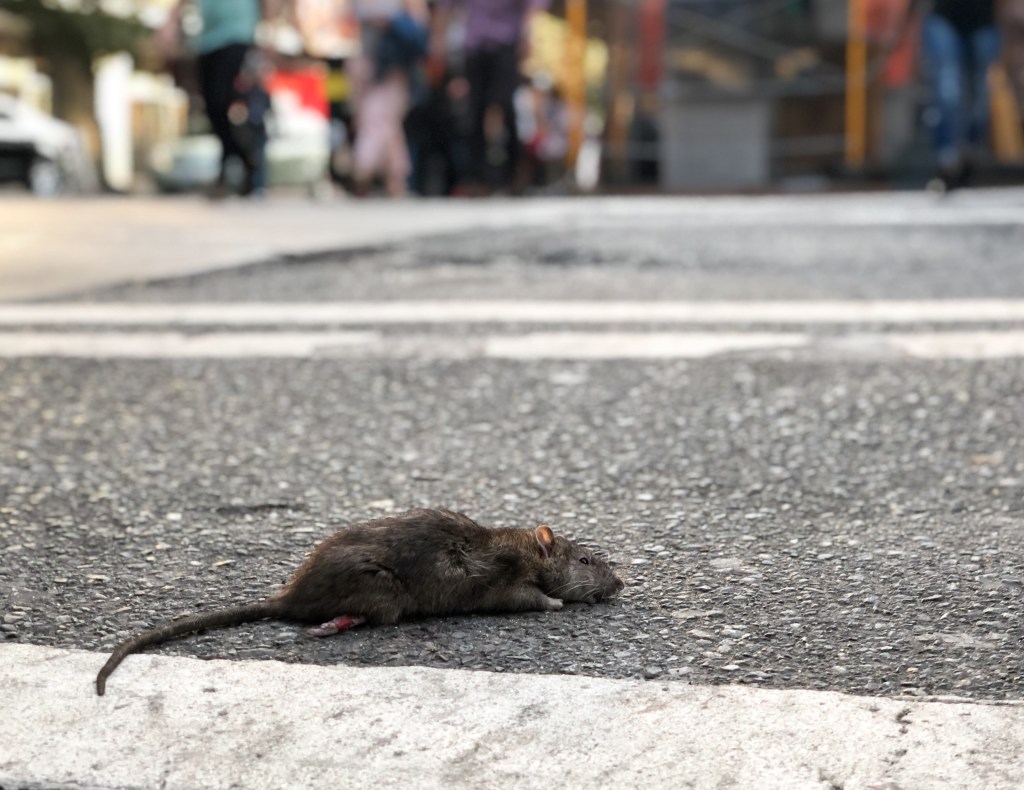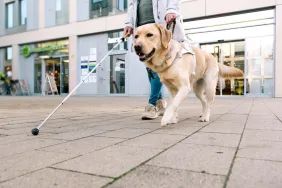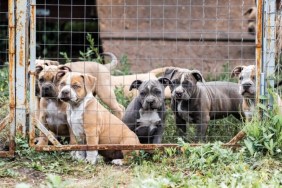From unforgettable culinary delights to iconic cultural hotspots, scenic wonders, powerful politicians, and lively nightlife experiences, there’s a lot attracting revelers to Washington, D.C. However, behind all the glitz and glamour is a worrying public health issue that’s been rocking the vibrant city for the past few years: an overwhelming rat infestation problem.
A 2023 annual survey of America’s most rodent-infested cities — compiled by Orkin Canada — ranked Washington, D.C., as the nation’s fourth “rattiest” city. After the pandemic, the rodent population in the district exploded, making sightings of rats on the streets, alleyways, and in dumpsters near eateries and entertainment joints now quite common.
As a response, one group of dog owners — who call themselves the “Ratscallions” — is putting their canine companions to work.
On most nights, the volunteer group — comprised of about 12 dog owners — hits the streets and alleys around the nation’s capital with their dogs, whose work is to find and kill rats. Most members of the Ratscallions own Terriers, a breed group historically kept to hunt rodents and other smaller game, thanks to their strong prey drive.
Linda Freeman, the Ratscallions ringleader, told The Washington Post her Bedlington Terriers enjoy hunting, which is why she chose to use them to deal with the district’s rat issue.
“When I go to put on my rat-hunting clothes, they just start jumping up and down,” Freeman shared. “They start barking and running in circles because they know they’re going to get to go rat hunting.”
How the Ratscallions and their dogs hunt down rats

Describing their rat-hunting attire, Freeman said Ratscallions usually wear thick-soled shoes since they sometimes have to walk on alleys littered with broken pieces of glass. She also explained they dress in long, well-fitting pants that aren’t too baggy. According to her, they’ve experienced an incident where “a rat ran up one gal’s pant leg.”
Additionally, each group member often wears a shirt with embroidery reading “Ratscallions.” The group also carries water and a first aid kit for their dogs, who sometimes get bruised by defensive rats.
According to the Ratscallions, rat-hunting is nothing less than team effort.
“There’s the dog and the handler, there’s the dogs that work together as a team, and then there’s the handlers that have to work together as a team,” said Bomani Mtume, one of the group members. He hunts the rodents alongside his Cairn Terrier.
‘Push dogs’ versus ‘catch dogs’
To find and kill the rats, the Ratscallions employ a particular strategy. They’ve categorized some of their dogs as “push dogs” and others as “catch dogs.” Once the group arrives at the targeted area, they release the push dogs. The work of these push dogs is to scare rodents from their hiding spots.
The Ratscallions prefer using smaller, sturdy hunting dogs as “push dogs.” That’s because these canines can easily climb up dumpsters or fit between tight spaces where rats hide. One of the group’s push dogs is a Dachshund called Dickie.
As the push dogs get to work, the “catch dogs” will wait nearby, ready to pounce on rats that will appear from their hiding spots. These catch dogs snap the rodents’ spinal cord with their jaws and shake them to death.
Afterward, the group picks up every dead rodent by the tail while wearing latex gloves. Finally, they dispose of the corpse in a ratbag, which is simply a black trash bag they walk around with.
Concerns over the use of dogs to kill the district’s rats

Not everyone is in support of what the Ratscallions do. Animal welfare groups in the city feel the group’s approach to dealing with the rat infestation problem is cruel.
The Ratscallions ringleader, Freeman, insists their way of controlling the overwhelming rodent population is more humane than other commonly used methods by the city. With glue tapes, for instance, rats die a slow, painful death by starvation. On the other hand, rats that end up ingesting poison experience internal hemorrhage and organ failure, and die after about two weeks of prolonged suffering.
“You time the death of a rat, using rat poison, with a calendar,” Freeman told the news outlet. “You can time the death of a rat in the jaws of a predator using a stopwatch. It’s usually less than five seconds. Tell me: What’s more humane?”
Despite the illegality surrounding rat hunting in Washington, the city has yet to condemn the Ratscallions approach to dealing with the rodent menace. Perhaps this may be because of the city’s ongoing struggle to control the increasing rodent population. Nonetheless, the group has garnered positive publicity from fellow residents.
Is it safe for dogs to hunt Washington’s rats

Rodents are known to spread diseases to humans and dogs — the most infamous, of course, being the plague. To protect their rat-hunting dogs, the Ratscallions prioritize vaccinations. In particular, Freeman stated their canines are well-vaccinated against leptospirosis. The potentially fatal bacterial disease can be transmitted from rats to dogs.
Moreover, Freeman explained their dogs don’t eat the rats; they only shake them to death. By doing so, they avoid getting secondary poisoning from rats that may have ingested rat poison. She further shared that the group first checks out rodent-infested areas to determine whether there’s rat poison poured in the area. If they see any powder, they refrain from releasing their dogs to hunt rodents in that spot.
Tackling Washington’s rat problem using dogs
Washington, D.C.’s growing rat problem continues to worry residents and public health officials alike, so much so that a group of dog owners opted to take matters into their own hands.
Although using dogs to deal with the city’s rat infestation problem isn’t legal, the Ratscallions believe their pest-control efforts make a huge difference in controlling D.C.’s alarming rodent population. So long as the number of pests continues to dwindle, it’s a wonder if anyone will stop the vigilante rodent hunters.









